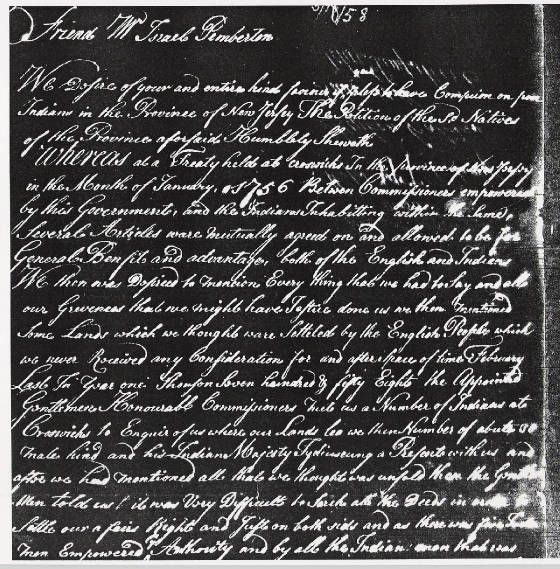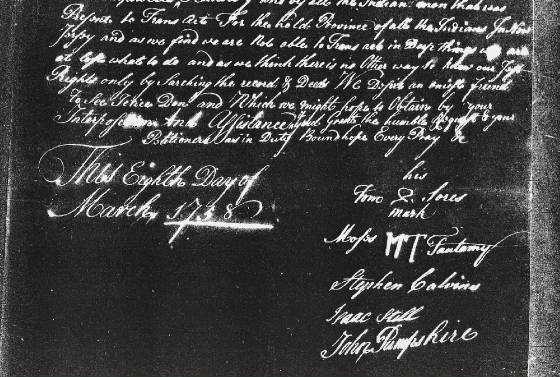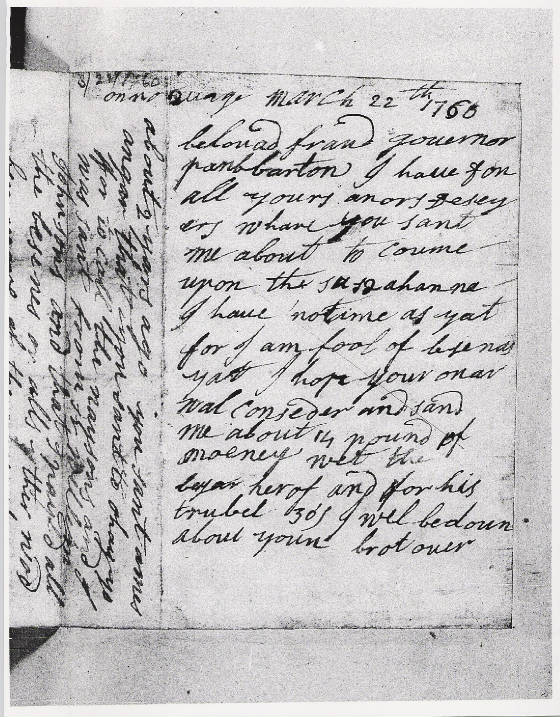|
Documents related to Indian land claims in New Jersey
When
the French & Indian War erupted, New Jersey
was exposed to raids along the Delaware River. As a result of the violence unleashed, pro-British Indians living within the colony feared for their safety;
not from their kinsmen, but from retribution by colonists. In December 0f 1755,
the Indians at the two native settlements of Cranbury and Bethel petitioned the New Jersey Assembly for protection from assault. The Assembly reviewed the matter, and directed that each county appoint agents to register local Indians
and issue them arm bands signifying their protection as inhabitants of New Jersey.
The Indian raids on the New Jersey
frontier were an immediate and violent expression of unsettled matters between
Indians and whites, and the New Jersey Assembly appointed commissioners to meet with Indians at Crosswicks in January 1756
in an effort to secure peace.
The Crosswicks Conference of
1756 led to ongoing efforts to secure a lasting peace among the Delawares and colonists. Peace negotiations were held from July 21 to August
7, 1757 at Easton, attended by both New Jersey and Pennsylvania Delawares.
Andrew Woolley, Thomas Store, and Peter Tule (also interpreted as Jule or July) complained of being defrauded of nearly
fourteen thousand acres of land in Middlesex County. In February 1758 thirty-nine Delawares met with New Jersey’s Indian Commissioners at Crosswicks. Here the Indians again submitted a list of land grievances
that the commissioners agreed to investigate and remedy. In addition to the various
Indian groups identified, including the Crosswicks and Cranbury communities, “the Indians, in general claim their settlements
near Cranbury, on Menolapan river, in Falkner’s tract, whereon many of the Indians now live.”
The Indians present were: The Indians were,
Teedyescunk, king of tbe Delawares. George Hopayock, from
the Susquehanah. Crosswick Indians: Andrew Wooley, George Wheelwright, Peepy,
Joseph Cuish, William Loulax, Gabriel Mitop, Zeb. Conchee, Bill News, John Pembolus.
Mountain Indians: Moses Totamy, Philip. Rariton Indian: Tom Evans. Ancocus Indians:
Robert Kekott, Jacob Mullis, Samuel Gosling. Indians from Cranbury: Thomas Store, Stephen Calvin, John Pompshire,
Benjamin Claus, Joseph Wooley, Josiah Store, Isaac Still, James Calvin, Peter Calvin, Dirick Quaquay, Ebenezar Wooley, Sarah
Stores widow of Quaquahela. Southern Indians: Abraham Loques, Isaac Swanelac.
John Pompshire, interpreter.
In the first
document is from Charles Read, Indian Commissioner for New Jersey to Israel Pemberton of the Friendly Association. He
refers to the law passed in 1757 authorizing the colony to settle all outstanding Indian claims.
The second letter was written by the five Indian men who were
granted power attorney by the Indians present at the February, 1758 conference at Crosswicks
to settle all land claims. In it we see their frustration in dealing with colonial officials. The Indians ask
Israel Pemberton for his assistance.
Read
to Pemberton, May 1757
May 17. 1757
Dr Fd.
I did not receive your favour till the latter part of last week & then understood that the Company were expected
back from the Treaty The Law wch was passed in this Colony respecting the Indians
you have herewith. It does not seem agreable to the generality of the people
here that We should interfere in Indian affairs I fancy they choose to keep out of the Expense of it, but I agree in Sentiment
wth you that it requires at this time the Joint care of the Colonies. I would have sent for Stephen Calvin if an opportunity had presented, but find that the Indians are so
universally addicted to Liquor that scarce one can be found who is not. & Stephen Calvin is no better than Pomplis or
Mickty were I have not been very hearty since my return from Elizabethtown [.] I am wth sincere regards yr
aff Cousin Charles Read


Indian Representatives to Israel Pemberton, March 8, 1758
Friend Mr Israel Pemberton
We Desire of your and entire kind faviour if [it] pless to have Com[passion] on poor Indians in the Province
of New Jersey The Petition of the sd. Natives of the Province Humbly
Sheweth
Whereas at a Treaty held at croswicks In the province of New Jersey in the Month of January, 1756 Between
Commissioners empowered by the Government, and the Indians Inhabiting within the Same, Several Articles were mutually agreed
on and allowed to be for General Benfit and advantage, both of the English and Indians We
then are Desired to mention Every thing that we had to Say and all our Grevences that we might have Jestice done us we then
Mentioned Some Lands which we thought ware Settled by the English People which we never Received any Consideration for and
after Space of time February Last in Year one Thouson Seven hundred & fifty Eight the Appointed Gentlemen Honourable Commissioners
meet us a Number of Indians at Croswicks to Enquire of us where our Lands be we
then Number of about 30 male kind and his Indian Majesty Tydiuscung a Report with us and after we had mentioned all that we
thought was unsold then the Gentlemen told us it was Very Difficult to Search all the Deeds in order to Settle our afairs
Rights and Justs on both sides and as there was five Indian men Empowered [with] Authority and by all the Indian men that
was Present to Trans act For the hold Province of all the Indians In New Jersey and as we find we are not able to Trans act
in Deep things we are at loss what to do and as we think there is no Other way to know our Just Rights only by Searching the
record of Deeds We Desire an enist friend to see Jetice Done and Which we might hope to obtain by your Interposition And Assistance
if [youd] Grant the humble Request [of] your Petitioners as in Duty Bound hope Every Pray &c
The Eight Day of March 1758 Tom S[t]ores his mark Moses MT Tantamy Stephen Calvin Isaac Still Juhn Pumpshire [Calvin’s handwriting]
Charles Read, NJ Official to Israel Pemberton, June 5, 1758
D F.
I recd yours of the 4th Instant & will immediately transmitt it to the President & Enforce
your Recommendations to the utmost of my power. I question whether He will incline
to Make this Colony Principals in a treaty or an Invitation but if any treaty whoudl be held so on He may send Commissioners
to it & propose a satisfaction for their Lands if they are really uneasy about them.
That the thing may not be delayed I will send it Express as soon as I receive his answer you shall immediately pursue
his Directions. I wish he was at Burlington the measures might be more speedily
taken I concurr wth you in opinion as to the ill uses the Indians have recd & am convinced your Sollicitude arises from
yr. desire of seeing the Public tranquility Established
I am Dr fr. Yr. affectionate Cousin Charles Read
June 5. 1758
Governor Denny’s Pass to Indian Delegation to Burlington,
New Jersey, June, 1758
Bearers of the Letters & their Company, as Friends & Brothers, and to accompany them
with a good & sufficient Escort by Bethlehem and down the public road to Burlington, whether they be conducted by Moses
Tetamy or Isaac Still the present Messengers, or by Teedyuscung or any other known friendly Indians, who may be employed by
him or them on this occasion, and who will for their further Security carry a small Union Flag, which they are to shew when
they come near any Fort or Settlement, and I do further strictly charge and command all Justices, Sheriffs & other Officers,
civil and Military and all his Majesty’s other Subjects within this Province not to molest or hinder or any wise hurt
these Indians, but to be kind to them & afford them assistance and every proper Thing they may stand in Need of.
Given under my Hand and Seal at Arms at Philadelphia
the twenty seventh Day of June Anno Domini one thousand seven hundred and fifty eight in the Thirty second year of his Majesty’s
Reign.
William Denny
Charles Read to Israel Pemberton, September 1758
Dr Fr
I rece yours by the stage boat this Morning first as I was going to Crosswicks to meet the
Indians to finish our affair with them…I am pleased wth General Forbes letter & tho’ yr propr may have been
highly criminal & there caution ought to be a necesity of yr approving his Conduct yett I am fully persuaded that unless
that matter can be tenderly handled The great business will be impeded.
I am sensible this is a Critical time & therefore I will if health permitt attend tho’
very injurious to my own Concerns – the Bearer wh this will give ye Genl. Forbe’s Letter…
I am Dr Frd. Yo Aff Cousin Charles Read
Septr. 11 1758

Joe Peepy to Israel Pemberton, March 1760
Joe Peepy was an important figure in the history of Indian-white relations during the French & Indian
War and into the American Revolution. One of Brainerd's converts, he moved to Pennsylvania after the death of David
Brainerd and became associated with the Moravians. When the French Indians began to attack eastern Pennsylvania, Peepy
instructed his family to move back to Cranbury (Bethel) for safey. He shuttled among the important centers of frontier
life during this time, including meetings with Sir William Johnson, Pennsylvania officials, Moravian settlements and the western
Indians of the Ohio country. He became a devout Moravian convert, and moved from the Susquehanna to the Muskingham in
1772 where he was a leader in the Moravian settlements. In 1781, he was warned by pro-British Indians to move further
west, which he did. However, Heckewelder infers that Joe Peepy was with his wife and his children and grandchildren
at the Gnadenhutten Massacre of March, 1782. His son, Anton, was so distraught and angered by the murder of his entire
family (including his wife and children), that he gave up his pacifist beliefs and fought alongside the Delawares against
the Americans during the rest of the war.
In this letter, Joe Peepy writes to Israel Pemberton for money and to advise him of Peepy's efforts.
The letter took six and-a-half weeks to reach Pemberton in Philadelphia. It is spelled in both the original
form, and with a translation.
[Reverse: Opaguaga March 22 1760] From Jo Peepy recd by Delaware John 9 5mo 1760
Onnoquaga March 22th 1760
belovad frand gouevnor pambbarton I have son all yours [messages] whane you sant me about to coume upon
the susqahanna I have no time as yat for I am fool of besinas yat I hope your onar wal conseder and sand me about 14
pound of moeney wet the barar her of and for his trubel 30 s I wel be down abou[ ] your brot over
[on side:] about 2 yars ago you sant me angan that you sant to
to ohayyo for to call the naysons and I was sant from sr. Willim Johnsons and that I [pay'd] all the besenes
or alls ther wod ben more of the naysshons
Beloved friend Governor Pemberton, I have seen all your messages when you sent me about to come upon the
Susquehanna. I have no time as yet for I am full of business yet I hope your honor will consider and send me about 14
pounds of money with the bearer hereof and for his trouble 30 s[shillings]. I will be down [ ]
About 2 years ago you sent me again that you sent to Ohio for to call the nations and I was sent from Sir William Johnsons
and that I [ ] all the business or else there would have been more of the nations.
Stephen Calvin to Isaac Still, August 1760
Isaac Still
Being in immediate want of some mony Israel Pemberton hat been so Kind as to send me three pounds which
sum I desire you to pay him & it shall be allow'd in part of the mony you remain indebted to me. Your Compliance
will oblige Your Friend Stephen Calvin
To Isaac Still in Pensilvania
Philad. 30 augt. 1760
Topic: Reason for Resentment & Alcoholism Amongst the Indians (same issues which
confronted Brainerd as expressed in his 1752 letter)
Minutes of the Philadelphia Yearly Meeting, Indian Committee, December 24, 1797
[Letter from General James Wilkinson, senior US officer at the time, quoted in the minutes:]
"Speaking once to George White Eyes [son of Capt. White Eyes, a Delaware Indian from south Jersey and noted
leader of the Ohio Indians during the colonial period], who was I believe Educated at Prince Town, respecting the incorrigible
attachment of the Indians to Savage Life, He replyed to me, "It is natural we should follow the footsteps of our fathers and
when you white People undertake to divert us from this path, you lead us to Eat, drink, dress, read, & write like yourselves
and then you turn us loose, to beg, starve or seek our native forests, without alternative, & outlawed [in] your Society,
we curse you for the feelings you have taught us, & resort to excess that we may forget them." [Wilkinson writing:] How
lamentable this and yet how just, for my part, my Dear Brother, could I be made instrumental in any way to ameliorate the
Condition of these People and lay the foundation of their permanent Prosperity, it would be more acceptable to me than the
most distinguished Triumph of Arms. A great source of my present happiness is the conviction that I have deserved and enjoy
the confidence and friendship of the Indians N. W. of the Ohio.
For a biography on Wilkinson, see: http://72.14.207.104/search?q=cache:IQQqOnPyjE8J:en.wikipedia.org/wiki/James_Wilkinson+General+James+Wilkinson&hl=en
American Indian Historical Research
For information on Brotherton & Weekping
For information on Weequehela & Spotswood, NJ
For information on the Gnadenhutten Massacre
For information on the Indian Company of 1778
|

